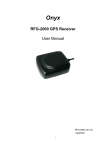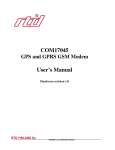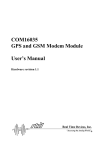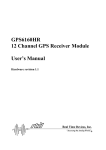Download Wave-radio iGPS-M User`s manual
Transcript
iGPS-M USER’S MANUAL 1 iGPS-M USER’S MANUAL Installation .................................................................. 3 Troubleshooting ............................................................... 5 iGPS-M Introduction ........................................................... 6 iGPS-M Key Feature ......................................................... 6 Possible Application ....................................................... 6 Familiarize your iGPS-M ....................................................... 7 Dimensions ................................................................. 7 Interface .................................................................. 7 Water-proof housing with magnet on the bottom .............................. 7 LED Light .................................................................. 7 iGPS-M Computer/Lap top and handheld device cable .......................... 8 Software Interface ............................................................ 9 NMEA Protocol .............................................................. 9 NMEA Messages .............................................................. 9 GLL – Geographic Position – Latitude/Longitude ............................. 9 GGA – Global Positioning System Fix Data .................................. 10 VTG – Course over Ground and Ground Speed ................................. 10 RMC – Recommended Minimum Specific GNSS Data .............................. 11 GSA – DOP and Active Satellites ........................................... 11 GSV – Satellites in view .................................................. 12 PFST,FOM – Position figure of merit ....................................... 12 PFST,PPS – PPS signal ..................................................... 13 2 iGPS-M USER’S MANUAL Installation Step I:Check your iGPS-M package Please check the iGPS-M package. If any items are missing or damaging, please contact our distributor immediately. The standard package of iGPS-M contains: l iGPS-M Receiver l iGPS-M Driver & Utility CD l Warranty Card l Quick Installation Guide l RS-232 cable or USB cable With different brand/type of handheld device, the iGPS-M receiver needs to use different type of car charger. Our company provides all kinds of car chargers, please refer to the section of iGPS-M car chargers and cables on page 7. If the iGPS-M receiver you purchased provides a car charger, please make sure it is suitable for your handheld device. Step II:Connect iGPS-M receiver to PC/Lap top or handheld device l Using RS-232 cable: please follow the illustration as below. To DB-9 port on PC/Lap top To USB port on PC/Lap Top l Using USB connector: please follow the illustration as below. Before the USB connector plugs in your PC/Lap top, please have your USB Driver Installation ready. (See the USB Driver installation guide for detail information). Remember to plug in the USB connector after your PC/Lap top started properly. Otherwise, your PC/Lap top operating system might judge iGPS-M as a mouse and affect the normal operation. 3 iGPS-M USER’S MANUAL To USB port on PC/Lap top l Using car charger: Please follows the illustration as below. You have to plug in the connector into Car Socket in order to have power supply for both iGPS-M receiver and handheld device. To Input/output port of handheld device Connect to Car Socket Step III:Check if the LED is flashing. Once your PC/Lap top or car charger supplies power, the iGPS-M receiver starts to provide the positioning function. At meantime, the LED will be flashing and it means iGPS-M is operating. 4 iGPS-M USER’S MANUAL Troubleshooting When your iGPS-M receiver could not operate, please follow the instruction to do the troubleshooting as below. 1. iGPS-M receiver’s LED is not flashing l It means iGPS-M does not have power supply. Please check if the connector plugs in properly as the step II. 2. iGPS-M receiver’s LED is flashing, but the connection between iGPS-M receiver and the E-map can not be established. Please make sure the settings of COM Port Number and Baud rate are correct. l Most of E-map provides scan function to search COM Port. Please scan it for the correct COM Port number that iGPS-M receiver is utilizing. l If a RS232 cable is used to connect to PC/Lap top, the COM Port number would COM1 usually. l The default Baud rate is 4800. l If a USB cable is used to connect to PC/Lap top, please make sure the UBS driver is installed successfully. 5 iGPS-M USER’S MANUAL iGPS-M Introduction The iGPS-M is an outstanding high sensitivity GPS receiver. Its excellent performance easily conquers the most difficult tasks. In addition, it provides various functions to meet customers’ demand. iGPS-M employs uNav’s powerful GPS solution. It provides marvelous navigation performance under dynamic conditions in areas with limited sky view like urban canyons. It also has high sensitivity for weak signal operation without compromising accuracy. U ndoubtedly, iGPS-M is the best choice for you. Market Leading System Performance Ultra-low, user configurable power management makes iGPS-M the lowest power consuming, complete 12-channel iGPS receiver on the market. Nevertheless, there are no compromises in performance. The iGPS receiver has a navigation sensitivity as low as –150dBm making it applicable even for extremely demanding applications and environments. iGPS-M Key Feature q Built in uNav chipset q Sensitivity: -150dBm (Tracking) q Thin module form factor – 45mm(L) x 45mm(W) x 8.5mm(H) q RTC back up and for first time to Fast Fix (TTFF) q iTALK and NMEA0183 v3.0 data protocols q Accurate 1PPS timing output q 8MBit Flash Memory q 3Sec Quick Start q Water resistant Possible Application q Mapping devices for PC & Pocket PC q Personal Navigation or touring devices q AVL and Location-Based service system q Data logging for marine Navigation q Support 1pps output for timer q Tracking devices/system q Mileage Management q Fleet Management q Car Navigation 6 iGPS-M USER’S MANUAL Familiarize your iGPS-M Dimensions Length:64 mm Width:57 mm Height:16.5 mm Weight:85+/-5 gram 6-pin female connector 2 meters long wire Interface As shown in the illustration on the right, the length of the wire on iGPS-M receiver is 2 meters. There is a 6 -pin connector for the connection to PC/Lap top or handheld device. The ping assignment is shown below. A. SP6-Pin Female Connector Ping No. 1 2 3 4 5 6 Function Rx TTL Tx TTL DC 5V RS232 Rx GND RS232 Tx Ping No. 1 2 3 4 5 6 Signal Tx (RS-232) +5VDC Tx (TTL) Ground Rx (TTL) Rx (RS-232) B. PSII Female Connector Water-proof housing with magnet on the bottom There are 4 magnets on the bottom side of iGPS-M receiver for adsorbing on your car. The housing of iGPS-M receiver has waterproof, it can avoid the water permeates your iGPS-M receiver while you adsorb it outside of the car. LED Light There is an LED light near the output cable on the back of iGPS-M receiver. When the iGPS-M supplied 5V DC power, the LED will be flashing. It means iGPS-M receiver starts to provide the positioning function. 7 iGPS-M USER’S MANUAL iGPS-M Computer/Lap top and handheld device cable Following table lists each kind of cables for connecting different type of PC/Lap top or handheld device. Category RS232 cable USB cable Handheld device cable Model Number iGPS-M-RS232C iGPS-M-USBC iGPS-M-CA-ACER N20 iGPS-M-CA-ACER S60 iGPS-M-CA-ASUS A600 iGPS-M-CA-ASUS A620 Remark: iGPS-M-CA-CASIO E115 While using the iGPS-M with handheld iGPS-M-CA-CASIO E125/EM500 iGPS-M-CA-CASIO E200 device, Car charger would supply power for iGPS-M-CA-Dell Axim X3 iGPS-M-CA-Dell Axim X5 both iGPS-M and iGPS-M-CA-Eten P300 handheld device iGPS-M-CA-I-PAQ 2200i/38xx/39xx iGPS-M-CA-I-PAQ 36xx/37xx iGPS-M-CA-Mitac Mio 338/528 iGPS-M-CA-NEC Pocket PC iGPS-M-CA-O2 XDA II/T-Mobile MDA iGPS-M-CA-O2 XDA/T-Mobile MDA iGPS-M-CA-Palm 500/505/T3 iGPS-M-CA-Palm Vx iGPS-M-CA-Siemens LOOX iGPS-M-CA-Sony N series iGPS-M-CA-Sony T series iGPS-M-CA-Toshiba e330/e740 iGPS-M-CA-Toshiba e400 iGPS-M-CA-Toshiba e570 iGPS-M-CA-Toshiba e800 iGPS-M-CA-Yakumo Delta 300 iGPS-M-CA-Yakumo Omnikron Type RS232 as I/O, power by USB USB for both I/O and power ACER N20 ACER S60 ASUS A600 ASUS A620 Casio E115 Casio E125/EM500 Casio E200 Dell Axim X3 Dell Axim X5 Eten P300 I-PAQ 2200i38xx/39xx series I-PAQ 36xx/37xx series Mitac Mio 338/528 NEC Pocket PC O2 XDA II/T-Mobile MDA O2 XDA/T-Mobile MDA Palm 500/505/Tungsten T3 Palm Vx Siemens LOOX Sony N series Sony T series Toshiba e330/e740 Toshiba e400 Toshiba e570 Toshiba e800 Yakumo Delta 300 Yakumo Omnikron USB cable RS-232 cable GPS/PDA Car charger 8 iGPS-M USER’S MANUAL Software Interface NMEA Protocol iGPS-M receiver currently supported 21 NMEA commands and 7 NMEA messages. The NMEA commands include NMEA, START, STOP, STORE, RESTORE, AUTOSTART, FIXRATE, DATUM, PWRDOWN, PPSMODE, SURVEYLEN, CABLEDEL, PPSPOS, PULSEPOS, PULSELEN, INITAID, ALTAID, SETLIMIT, SYNCMODE, SW, and HW. The respond messages include GPGLL, GPGGA, GPVTG, GPRMC, GPGSA, GPGSV, and “PFST,FOM”. NMEA Messages The NMEA-0813 message consists of fields as following: $GP<message id>,<data field>,<data field>,,, ..*<checksum><CR><LF> Message starts with ‘$GP’ followed by message id field. Message data fields are separated by commas ( , ) and the message ends after checksum field and carriage return <CR> and line feed <LF> control characters. Delimiter ‘*’ precedes the checksum field. Note t hat data fields may be NULL (missing). Null data fields contain no characters but are still separated by commas, for example: $GPGGA,134158.48,6016.3072,N,02458.3788,E,1,08,1.2,,,,,,0000*1E GLL – Geographic Position – Latitude/Longitude Latitude and Longitude, UTC time of fix and status. Format: $GPGLL,xxmm.dddd,<N|S>, yyymm.dddd,<E|W>,hhmmss.dd,S,M*hh<CR><LF> Example: $GPGLL,6016.3073,N,02458.3791,E,134157.48,A,A*26 Parameter xxmm.dddd <N|S> yyymm.dddd <E|W> hhmmss.dd S M hh Description Latitude, xx = degrees, mm = minutes, dddd = decimal part of minutes Either character N or character S, N = North, S = South Longitude, yyy = degrees, mm = minutes dddd = decimal part of minutes Either character E or character W, E = East, W = West UTC time, hh = hours, mm = minutes, ss = seconds dd = decimal part of seconds Status indicator, A = valid, V = invalid Mode indicator, A = autonomous, N = data not valid Check sum 9 Example 60 deg. 16.3073 min. North 24 deg. 58.3791 min East 13:41:51.48 Valid Autonomous 26 iGPS-M USER’S MANUAL GGA – Global Positioning System Fix Data Time, position and fix related data for a GPS receiver. Format:$GPGGA,hhmmss.dd,xxmm.dddd,<N|S>,yyymm.dddd,<E|W>,v,ss,d.d,h.h,M,g.g,M,a. a,xxxx*hh<CR><LF> Example: $GPGGA,134829.48,1126.6639,S,11133.3299,W,1,07,1.0,,,,,,*15 Parameter hhmmss.dd xxmm.dddd <N|S> yyymm.dddd <E|W> v ss d.d h.h M g.g M a.a xxxx hh Description UTC time, hh = hours, mm = minutes, ss = seconds, dd = decimal part of seconds Latitude, xx = degrees, mm = minutes, dddd = decimal part of minutes Either character N or character S, N = North, S = South Longitude, yyy = degrees, mm = minutes, dddd = decimal part of minutes Either character E or character W, E = East, W = West Fix valid indicator, 0=Fix not valid, 1=Fix valid Number of satellites used in position fix, 00-12. Fixed length HDOP – Horizontal Dilution Of Precision Altitude (mean-sea-level, geoid) NULL (missing) NULL (missing) NULL (missing) NULL (missing) NULL (missing) Check sum Example 13:48:29.48 11 deg. 26.6639 min. South 111 deg. 33.3299 min. West Fix valid 7 satellites HDOP = 1.0 15 VTG – Course over Ground and Ground Speed Course and speed Format: $GPVTG,h.h,T,m.m,M,s.s,N,s.s,K,M*hh<CR><LF> Example: $GPVTG,202.60,T,,,0.38,N,0.7,K,A*0D Parameter h.h T m.m M s.s N s.s K M hh Description Example Heading 202.60 Degrees (heading units). Degree Magnetic heading. Currently NULL (missing). Degrees. Magnetic heading units. Currently NULL (missing). Speed, knots. Speed = 0.38 Knots (Speed unit) Knots Speed, km/h. Speed = 0.7 km/h (Speed units). km/h Mode indicator, A = autonomous, N = data not valid Autonomous Check sum 0D 10 iGPS-M USER’S MANUAL RMC – Recommended Minimum Specific GNSS Data Time, date, position, course and speed data. Format: $GPRMC,hhmmss.dd,S,xxmm.dddd,<N|S>,yyymm.dddd,<E|W>,s.s,h.h,ddmmyy,d.d, <E|W>,M*hh<CR><LF> Example: $GPRMC,134829.486,A,1126.6639,S,11133.3299,W,58.31,309.62,110200,,,A*14 Parameter hhmmss.dd S xxmm.dddd <N|S> yyymm.dddd <E|W> s.s h.h ddmmyy d.d <E|W> M hh Description UTC time, h = hours, mm = minutes, ss = seconds, dd = decimal part of seconds Status indicator, A = valid, V = invalid Latitude, xx = degrees, mm = minutes, dddd = decimal part of minutes Either character N or character S, N = North, S = South Longitude, yyy = degrees, mm = minutes, dddd = decimal part of minutes Either character E or character W, E = East, W = West Speed, knots. Heading Date, dd = date, mm = month, yy = year Magnetic variation Declination. Either character E or character W, E = East, W = West Mode indicator, A = autonomous, N = data not valid Check sum Example 13:48:29.486 Valid 11 deg. 26.6639 min. 111 deg. 33.3299 min. West 58.31 Knots 309.62 deg. 11th, Aug. 2000 Autonomous 14 GSA – DOP and Active Satellites GPS receiver operating mode, satellites used in the navigation solution reported by the GGA sentence, and DOP values. Format: $GPGSA,a,b,xx,xx,xx,xx,xx,xx,xx,xx,xx,xx,xx,xx,p.p,h.h,v.v*hh<CR><LF> Example: $GPGSA,A,3,03,15,17,18,22,23,,,,,,,4.7,3.7,2.9*37 Note: Parameter a b xx p.p h.h v.v hh Description Example Mode: M = Manual, forced to operate in 2D or 3D mode. Automatic A = Automatic, allowed to automatically switch 2D/3D. Mode: 1 = Fix not available, 2 = 2D, 3 = 3D 3D ID (PRN) numbers of GPS satellites used in solution 03,15,17,18, 22,23 PDOP PDOP = 4.7 HDOP HDOP = 3.7 VDOP VDOP = 2.9 Check sum 37 11 iGPS-M USER’S MANUAL GSV – Satellites in view Number of satellites in view, satellite ID (PRN) numbers, elevation, azimuth, and SNR value. The information for four satellites maximum per one message, additional messages up to maximum of eight sent as needed. The satellites are in PRN number order. Before a position fix is acquired the information contains only the SNR (signal to noise ratio) value. After a fix is acquired, also the elevation and azimuth angles are added. Note that there can be also “theoretical” satellites in the GSV message. These are satellites of which the angles (elevation, azimuth) are known but for some reason, e.g. due to an obstruction, have not been found by iTrax02. The SNR value for these satellites is therefore zero. Format: $GPGSV,n,m,ss,xx,ee,aaa,cn,…………. ,xx,ee,aaa,cn*hh<CR><LF> Example: $GPGSV,4,1,14,03,66,207,50,08,09,322,44,11,01,266,42,14,00,155,00*79 $GPGSV,4,2,14,15,41,088,48,17,21,083,44,18,57,087,51,21,57,173,50*78 $GPGSV,4,3,14,22,05,203,00,23,52,074,49,26,17,028,44,27,00,300,00*79 $GPGSV,4,4,14,28,32,243,00,31,48,286,00*70 Note: There are 14 satellites in view. The examples in following table only explain the information of satellite No.03 on the first message. Parameter n m ss xx ee aa Description Total number of messages, 1 to 9 Message number, 1 to 9 Total number of satellites in view Satellite ID (PRN) number Satellite elevation, degrees 90 max Satellite azimuth, degrees True, 000 to 359 Example 4 messages Message No.1 14 satellites No.03 66 deg. 207 deg. cn hh SNR ( C/No) 00-99 dB-Hz. zero when not tracking Check sum 50 dB-Hz 79 PFST,FOM – Position figure of merit Figure of merit (FOM) value for the position fix. Indicates the accuracy of the position in meters. The FOM value cannot be calculated before at least one fix has been made with more than four observations (five satellites, or four satellites and an altitude aid); before that a value “ –1” is reported, indicating that FOM is not available yet. After this the FOM value is always available the only exception being the altitude aiding modes when a fix has been calculated using three satellites. Format: $PFST,FOM,n*hh<CR><LF> Example: $PFST,FOM,3*66 Parameter n hh Description Position FOM value, i.e. the position accuracy in meters. Check sum 12 Example 3 meters 66 iGPS-M USER’S MANUAL PFST,PPS – PPS signal The pulse per second message. Indicates the parameters of the PPS pulse that will shortly be outputted. Provides the current GPS time and timing correction of the coming PPS pulse. Format: $PFST,PPS,wwww,tttttt,n,xxxx*hh <CR><LF> Example: $PFST,PPS,1161,309566,9,495*67 Parameter wwww tttttt n xxxx hh Description Example GPS Week, i.e. number of full weeks elapsed since 1161 weeks midnight 5-6 January 1980. Time of Week (seconds from the beginning of the current 309566 sec. GPS week). Number of satellites used when calculating the 9 satellites solution. Short-time pulse offset of the physical PPS pulse signal4.95 ns (units of 0.01 ns, in range of approx. -15.3 .. 15.3 ns). The correct pulse time can be calculated by subtracting this offset from the physical PPS pulse instant. Check sum 67 13























